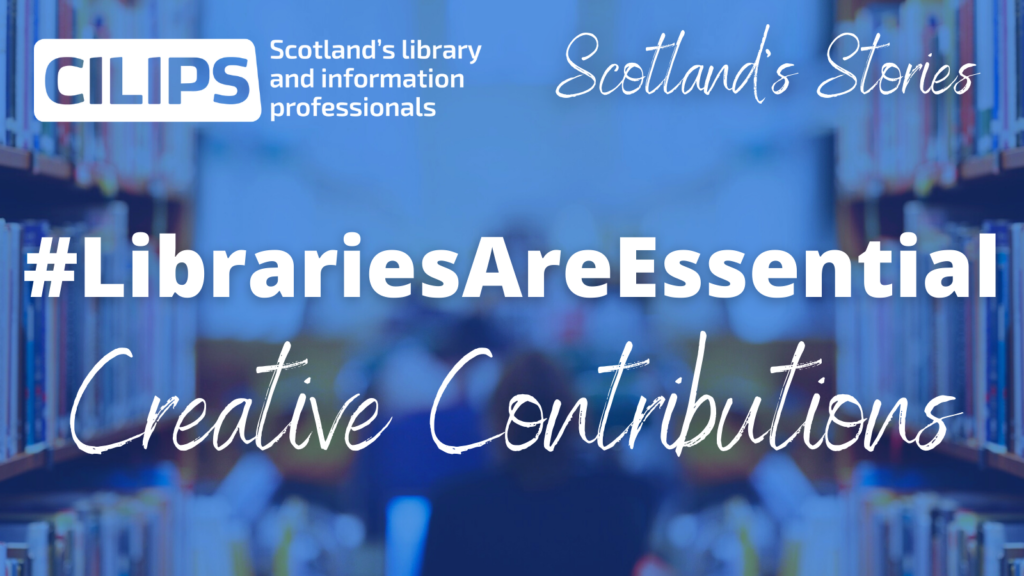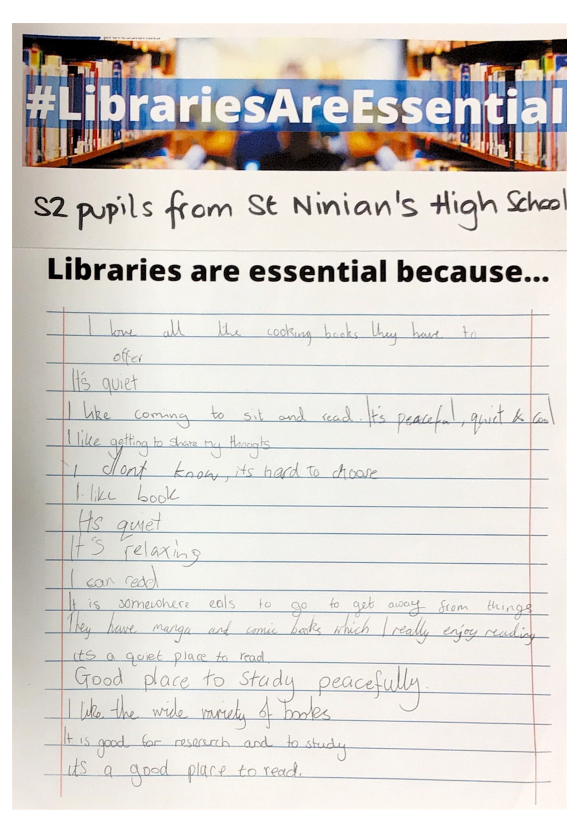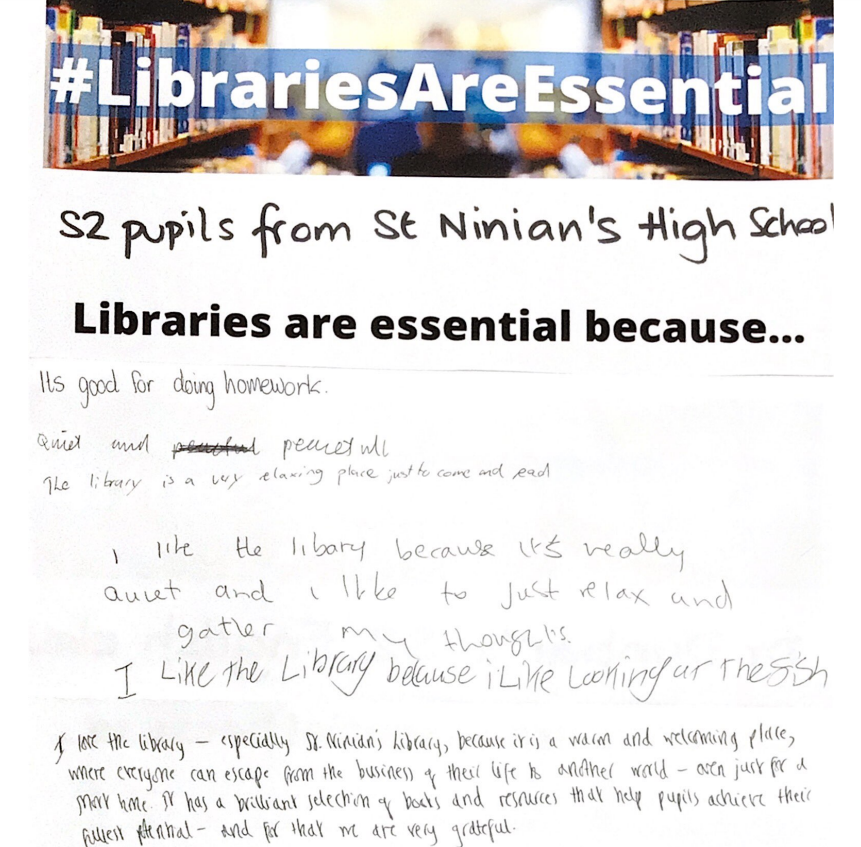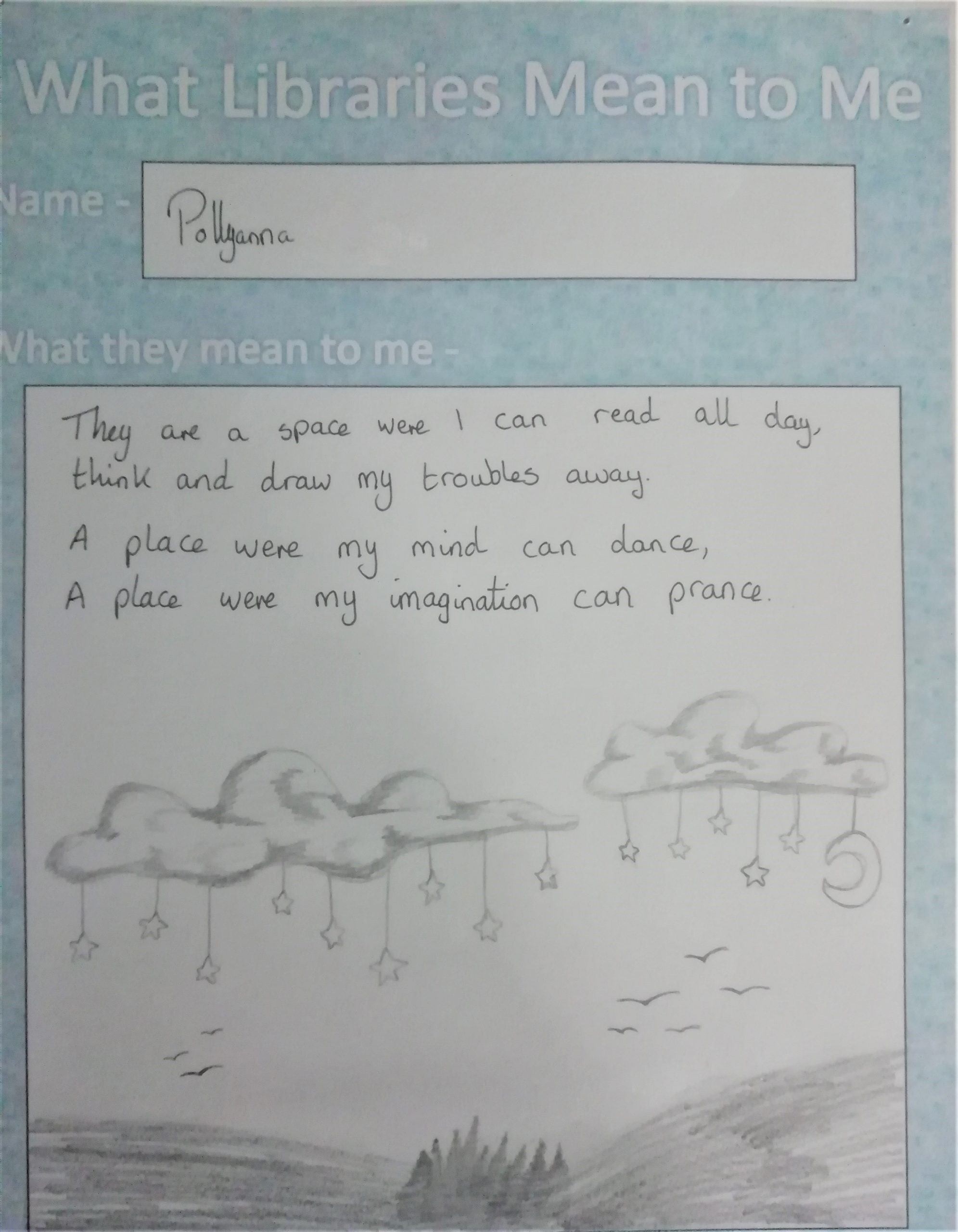#LibrariesAreEssential – Creative Contributions
We’ve been delighted to see so many creative responses to our #LibrariesAreEssential campaign and wanted to share some of the highlights with you here. Enjoy, and thank you so much to everyone who has shared their love for libraries – essential to Scotland’s Stories past, present and future!
‘It is somewhere calm to go to get away from things…’ ‘I like getting to share my thoughts…’ ‘a warm and welcoming place where everyone can escape from the busyness of life to another world…’ When School Librarian and SLG Scotland Vice-Chair Pamela McLean asked S2 pupils from St Ninian’s High School why #LibrariesAreEssential to them, their community of young library lovers had lots of fantastic ideas.
Click here to download the template and share your stories too!
~~~~~~~~~~~~~~~~~~~~~~~~~~~~~~~~~~~~~~~~~~~~~~~~~~~~~~~~~~~~~~
Libraries are Essential
Libraries are essential, a space to
Inspire us, involve us, allow us to
Borrow stories, knowledge, books! To belong,
Read and listen, share our inspirations,
A space of our own that’s not home where we
Return, reserving some time to remain
In the warm, with a friend, a group, a book,
Enjoying the space to work, to craft, or
Singing with Bookbug. Essential and good.
by poet, editor and library professional Cara L McKee
~~~~~~~~~~~~~~~~~~~~~~~~~~~~~~~~~~~~~~~~~~~~~~~~~~~~~~~~~~~~~~
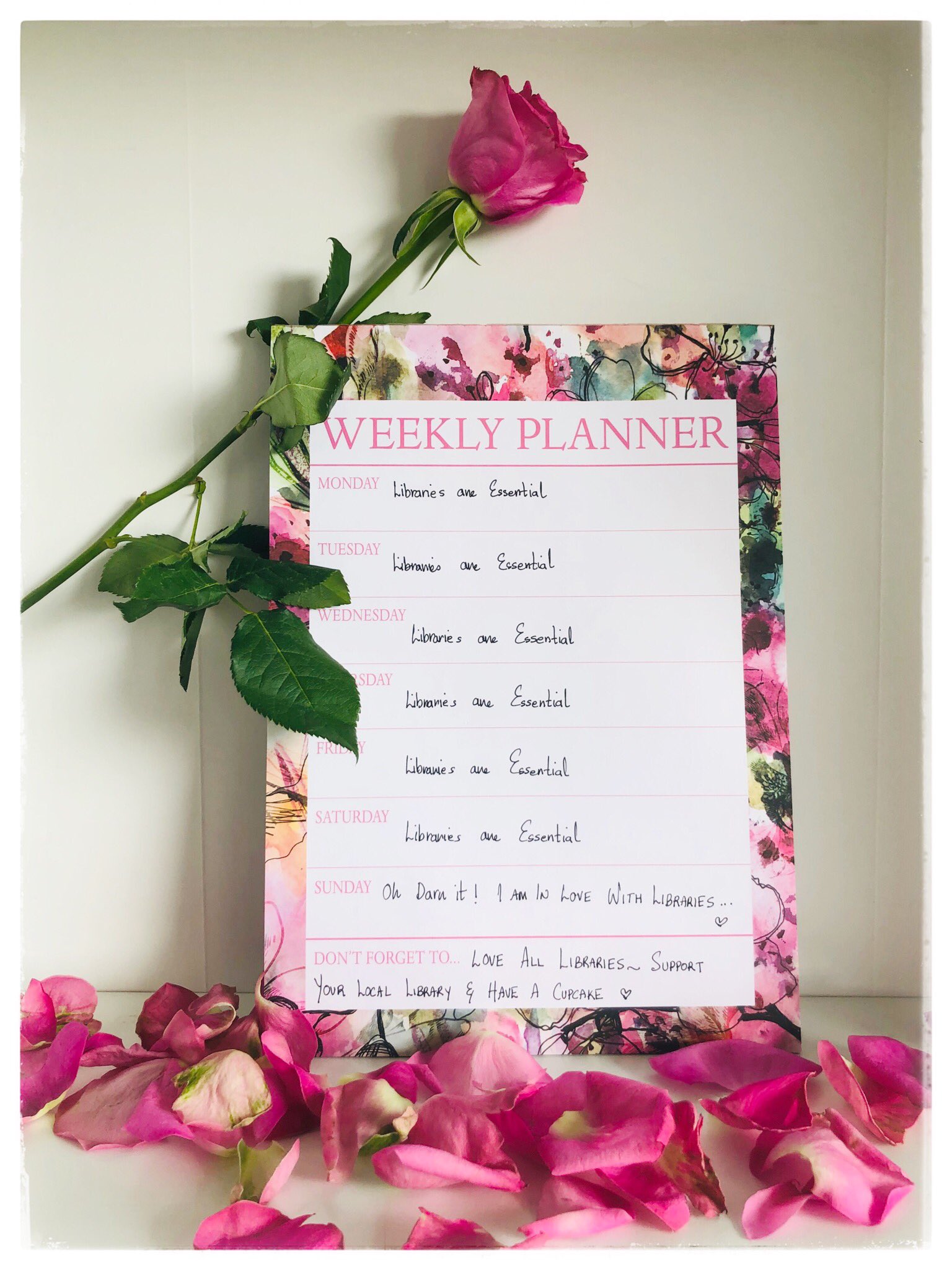
Shahnila’s wonderful weekly planner reminds us all that #LibrariesAreEssential every day of the week!
~~~~~~~~~~~~~~~~~~~~~~~~~~~~~~~~~~~~~~~~~~~~~~~~~~~~~~~~~~~~~~
The library as a bastion of liberty
The alphabet is ruler in this place,
maintains strict order – subject, author’s name –
so readers find books quickly: with what aim,
evil or good, is left to them. This space
is free in every sense. Where despots rule
books are the first to burn unless they echo
the Leader’s Big Idea. A thirst to know
is dangerous to those who would control
the minds of others, but it is our right.
On these neat shelves, even in this digital age
someone may browse at random, find a page
which detonates a thought so strong, so loud
their life, and others’ lives, are changed for good.
These hushed rooms house a store of dynamite!
by A C Clarke
~~~~~~~~~~~~~~~~~~~~~~~~~~~~~~~~~~~~~~~~~~~~~~~~~~~~~~~~~~~~~~
My First Library by Tom Murray, Scottish Book Trust Reader In Residence to Scottish Borders Libraries 2013-2014
Apart from the school library, the first library I joined was Airdrie Library. I would like to claim it was to explore further my love of Shakespeare or delve into ancient philosophy. More prosaic reason: to help me, so I naively believed, talk to girls. My defence is that I was fourteen at the time, and the phrase ‘wouldn’t say boo to a goose’ springs to mind. I loved football and sports in general, and my reading was comics especially Roy of the Rovers. Still love Roy of the Rovers, received an annual of stories as a Christmas present a few years back. I can’t remember back then ever, apart from in school, reading a book.
Airdrie library is a magnificent building with an observatory as part of the building. I didn’t know that at the time and for a good few years after. Rather than study the stars, I had the more pressing need to study words to impress the girls. Naturally the first books taken out were mostly eight hundred pages of close type. A lot of words in type I was barely able to read without a Sherlock Holmes type magnifying glass. Dickens was an early choice. Barnaby Rudge if I remember right was the first novel I took out the library. I got as far as the blurb and a drop-jawed flick through the endless pages. Not then but now Dickens is one of my favourite authors. Reading likes aren’t always instant but can grow with you. I also took out Victor Hugo’s Les Misérables, mainly for the fact that it included some poems in French and English translation. I imagined it casually falling out of my school bag.
‘You speak French?’ she said.
‘Oui.’ I casually replied.
It stayed in my imagination as I never had the confidence, or good sense prevailed, to try it. It took me a good while but I did read Les Misérables. I still love a hardback full-weighted book. My bookshelves groan with them.
Even though I never did learn how to talk to girls in French, joining the library was the start of my discovery of a world I barely knew existed. I had always been a dreamer, making up stories inside my head. That walk through the library doors was the beginning of the realisation that I could write my own stories. I did and eventually became a full-time writer, after many years working in a textile factory.
There are many other reasons to enter a library, alongside taking out books. Company, information, the road to confidence, escape into another world. I always think of the library as like the Tardis. So much bigger on the inside than out. Once you travel in a library you are never the same person again but an expansion of yourself. A library doesn`t belong to anyone or exist in the now, but to everyone and is timeless.
~~~~~~~~~~~~~~~~~~~~~~~~~~~~~~~~~~~~~~~~~~~~~~~~~~~~~~~~~~~~~~
Please,
do enter. Yes, these old doors creak
don’t they? No matter, no mind will
notice absorbed as they are. Please,
look round. Up and down, rank and rank
of bared spine. Run fingers over bindings,
read the names written, breathe it,
verso, recto, verso, recto.
You hesitate? It’s only natural, here
you hang on worlds’ edges. It wouldn’t do
to plunge too quick. You taste potential
and it is sweet and heady and endless.
What will you do with this feeling,
where will you go? No, I can’t come –
let go my hand, take your first step,
I’ll be waiting when you come back, yes
you will come back many, many times.
I just know, trust me. As to how to find
your way, your way will soon find you.
It’s ok, don’t be afraid. Step, run, jump,
worlds are waiting for you, go
and pick your first one.
First published by Pushing Out the Boat.
~~~~~~~~~~~~~~~~~~~~~~~~~~~~~~~~~~~~~~~~~~~~~~~~~~~~~~~~~~~~~~
Libraries Rock by David McVey
Back in 2010, right at the start of post-recession austerity, an egregious pro-cuts demonstration descended on Westminster. Now, this is a democracy and everyone is entitled to their opinion, even if they think austerity is great. That’s what I thought, anyway, as I watched on television, and then something caught my eye. One of the protestors carried a home-made placard that read;
LIBRARIES SUCK!
It’s just a bit of fun, I suppose he might have argued. But some things are too important to joke about.
Libraries. We all love them (except Libraries Suck Guy). You can read books, consult books, borrow books or simply breathe in the atmosphere of books; you can work, study, research, use the Wi-Fi and, these days, relax in the café. What would we do without them?
Much has been written, rightly so, about the contribution public libraries make to the communities they serve. But what of libraries for writers? These days, I find myself working in libraries more and more (or at least I did pre-Covid); perhaps one day I’ll be carried out of a library clinging to a desk when some philistine councillors try closing it. I use libraries to do some primary literary/historical research, for there’s nothing like getting your hands dirty with original manuscripts that scarcely anyone has accessed before. I also use them, as we all do, to access published resources. But most of all I like to work in them, in relative peace surrounded by books and readers and scholars and learning. Yes, there’s an appeal to working in cafes (and it worked for Rowling) or at home. But lattes are expensive and after two years many of are a little sick of working at home. And suppose you are working at home and from your window you see your neighbour clatter out onto the decking; he then turns on a dopey commercial radio channel at full blast and starts bawling into his phone, initiating a loud blokey chat with some like-minded soul, and then charges up the Black and Decker. To the library!
There’s a strange pleasure about visiting libraries that are new to you; Knightswood Library, a local authority resource in Glasgow’s northwest suburbs, and London’s British Library were my last new libraries before the Pandemic. Not long before, I had made my first visit to the Bodleian’s Weston Library and Radcliffe Camera. At football matches I sometimes notice those odd trainspottery fellows who ‘collect’ football grounds; they call themselves ‘groundhoppers’. Perhaps I’m a libraryhopper?
Libraries are not for everyone. Some people don’t like the quiet, the dust, the formality; others, by contrast, dislike the buzz and bustle or the aromas of coffee and pizza toppings you get when the library has a café. Libraries work for me, though I prefer the quieter ones. In a library, there are no distractions from TV or fridge or music, no disruption from cloddish neighbours or Amazon deliveries.
Some libraries are under threat yet others have visitors flocking to them. I’ve scoffed branded chocolate from gift shops in both the National Library of Scotland and the Bodleian. With Society of Authors in Scotland groups I’ve had backstage tours of the National Library and Glasgow’s legendary Mitchell Library. Perhaps tourism is one route to broadening libraries’ reach; after all, even the smallest local library welcomes members of the Scottish diaspora returning to research their roots.
I’m not wealthy nor am I a shopaholic (except in bookshops) so I don’t have a huge collection of credit cards. However, as a libraryhopper I have amassed a surprising number of library reader cards;
- East Dunbartonshire Council (my local area)
- Glasgow Council (enabling me to access the great Mitchell Library)
- Highland Council
- National Library of Scotland
- National Records of Scotland
- Scottish Poetry Library
- University of Strathclyde (I’m an alumnus)
- New College Lanarkshire (where I’m a part-time lecturer)
- Bodleian Library
- British Library
- Institute of Historical Research Library
- University of the West of Scotland (where I used to work – this card is, I suspect, long expired but one day I’ll try to bluff my way in with it)
I’ve been in other libraries, too. During my postgraduate year, the University of Strathclyde migrated its library to a new site so for my thesis I was allowed to use the University of Glasgow’s library. More recently, for research purposes, I needed access to a Canadian literary journal from 1932. The only holding I could find in Scotland was at the University of Glasgow, so I applied to view it. I was directed to the library’s annexe – a unit on a trading estate in North Glasgow built on a former factory site. Adjoining the barely noticeable entrance to the annexe were a tool hire firm, an angling supplies retailer and a Chinese food wholesaler. Inside, though, the atmosphere was just like any library in any era, not a 1990s-built commercial unit. I was presented with my volume and for a couple of hours I sat making pencil notes, before emerging into the daylight, blinking like a mole, for a 75 bus back to the city centre. I’d been the only client. It must be a lonely posting for a librarian, this Kafkaesque outpost of bookishness.
Librarians sometimes have a reputation for frostiness, for guarding access to their resources with an unsmiling zealousness. It’s a stereotype that simply doesn’t stand up. I’ve rarely encountered any of that from library staff and most are very helpful indeed. Those in the National Library of Scotland have a deserved reputation; it’s as if they know they are the custodians of great treasures and encourage people to access them. A special word for staff in the Bodleian, too; when I arrived in Oxford I wondered what they’d make of some Glaswegian FE lecturer seeking to get his proletarian paws on their books and manuscripts, yet they were welcoming and helpful beyond words. And if library staff are so helpful, libraries must have a future.
A week ago I gave a talk for Local History Month in my local library, the William Patrick Library in Kirkintilloch. It was held in the Archives and Local Studies room in which I have spent many hours over many years. As I told my story I also outlined where I had researched it: right here in the William Patrick, in the University of Strathclyde Library, in the UWS Library, the Bodleian, the British Library, the National Records of Scotland, even the library of the Royal Botanic Garden Edinburgh. Without libraries I suspect I’d have very little to say.
The Archives and Local Studies room had only just re-opened after the pandemic. And this was my first lecture to actual people in two years (I still Zoom for college). And it was in a library.
Use libraries and spread the word about them. I fear councils and some academic institutions will see libraries as a soft target after the pandemic, when in fact we’ll need them more than ever.
~~~~~~~~~~~~~~~~~~~~~~~~~~~~~~~~~~~~~~~~~~~~~~~~~~~~~~~~~~~~~~
Public Libraries by Stephanie Green
Ahh. Saturday mornings, when our Dad took us down to change our books – and we always came away laden with the full quota. Once I’d grown out of the (at that time in the 50s and 60s) limited children’s section, I was unsure what to read. Green/e seemed a good place to start, being my own surname and so in this rather haphazard way I worked my way through the entire canon of Graham Greene and Henry Green. How they coloured my (green) world view for years. As a 13 year old with no experience of any world other than a convent-school, it was certainly a revelation. (Not that I had any understanding that affaires amoureuses were going on in the latter.) But I had entered a grown-up world of sensibilities, complicated half-inarticulate emotions, that spoke to my own adolescent loneliness – perhaps I was not so alone. And what an introduction to style: Greene’s page-turning pace and Green’s elliptical, minimalist dialogue.
With my father in the forces, and a new posting every three years, there was no way he was going to transport boxfulls of books every move. So Dad’s shelves were limited to mainly factual books -a leather-bound Encyclopaedia was prominent. In these days of the internet, perhaps homes no longer need encyclopaedias in book form? But facts are not enough. How about the awakening of the imagination, fostering of understanding and empathy with other people? (If you want to understand emotional relationships, read novels).
But a handful of books was not going to last the summer hols. Thank G for the public library…without which I doubt I’d have made it to university. And so on…
I’m told our house is known as ‘the second hand book store’ by our son’s school mates when they visited – every room has that slightly musty smell of old paperbacks…but even in a house of writers like ourselves, there are more books we want to read, far more than we can possibly afford to buy, or have space to store…so it’s back to the public library.
And what about people who were not fortunate enough to be born into a home full of books? Or cannot afford any books, let alone more books?
Find more about why #LibrariesAreEssential on Stephanie’s blog here.
~~~~~~~~~~~~~~~~~~~~~~~~~~~~~~~~~~~~~~~~~~~~~~~~~~~~~~~~~~~~~~

Joy McLean’s powerful poem is a call to arms for all those who care about tackling disinformation, highlighting the essential role that libraries play on the frontline
~~~~~~~~~~~~~~~~~~~~~~~~~~~~~~~~~~~~~~~~~~~~~~~~~~~~~~~~~~~~~~
My Luve Is Like A Read, Read Story
Wee cosy, tranquil Gatehouse* Library
Ah come in quite a lot tay see yi,
Tay read yir books and use yir wifi
An’ chat tay Joannie**,
Sae noo Ah’m goannie sing yir praises,
Ah’m pure dead goannie.
Ye’re sic’ a cultural oasis,
Wan o’ ma favourite learnin’ places,
Yir books can form the verra basis
O’ Scottish brain power,
Enrichin’ minds an’ cheeky faces
O’ Scottish wean power.
So let us pray they never close yi
Tay those who would, we will oppose yi.
We’ll be the storm an ill wind blows yi
At sic’ a crunch time.
The only closin’ we’ll allow
Is Joannie’s lunch time.
* Gatehouse of Fleet in South West Scotland
** Joan, the librarian
by Chik J Duncan, Writer, Storyteller and Performer of Poyums
~~~~~~~~~~~~~~~~~~~~~~~~~~~~~~~~~~~~~~~~~~~~~~~~~~~~~~~~~~~~~~
Negative Space by Nathalie Rosset
She doesn’t belong here, doesn’t necessarily belong anywhere. If she sits in the library, it’s because the place is open to the public and she believes that she is the public. She stops by every so often to remind herself of that, as a precautionary measure, just in case the public might become something of the past, like tippex or dymo tape. She shuffles around the slow-paced revolving doors, passes the community-friendly stalls, then climbs two flights of stairs before penetrating the Quiet Zone, aiming for the corner desk, always empty, always exposed to sly drafts intruding through the imperceptible gaps in the surrounding window frames. Quietness doesn’t oblige comfort. She doesn’t choose to sit here because quietness is de rigueur, but because outwith the boundaries of the Quiet Zone the library turns into a whispering communal study room which trebles-up as a tumultuous café and social hub. The Quiet Zone acts as a museum of silence where scarce folks curate the preserved environment with their subdued presence.
But she knows that only flatters her misplaced nostalgia. In truth, if she elects temporary residency in the Quiet Zone, it’s out of an irrepressible fascination for its noises. Silence brings noise to the foreground, like colour on a white canvas, or marks on an unspoiled surface. Would you hear the soft, muted taps of fingertips on the laptop keyboard if not wrapped in silence? Would you perceive the perfection of the town clock’s pitch as it travels along the thick air of the High Street and pierces through the clamour of the outside world only to land, intact, on the other side of noise? Would you know that different materials produce different effects, when someone crosses their legs, the resistance slipping between a knee and a thigh, sometimes hardly any resistance at all but a smooth skid like skin rubbing against skin, like a caress even? Would you notice the sharp, yet languishing, grating of the extreme end of a notebook catching the rough grain of the palm of a hand, like an agile fishmonger skins a herring in one brisk movement, or a stoic parent removes a plaster from a long-healed wound telling their child ‘It won’t hurt if I do it quick’?
Without quietness, you wouldn’t hear the rich variety of closing devices running along our tightened bodies, a button popping shut, the small gears of a zip fastening up in a flash, a buckle locking in a click, a clasp shutting old leather, velcro digging its hooks deep into loops. You wouldn’t make out the whispers of shared clarification, the sights of speechless boredom, the gasps of sudden revelation. You wouldn’t discern the essence of human frailty, tiredness as a pen drops from loosening fingers, numbness as a heel drags along the carpet, clumsiness as a bottle of water is knocked over a desk. You wouldn’t catch the evanescence of human discretion, a tongue coming off a moist palate, a stomach gurgling away like a running siphon, a burp stifled by a brusque tension of the polite fibres, a joint grinding by dint of inner compression. And what about the scratching of the head when every single hair rubs against its neighbours, the gulping down of liquid when the throat moves up and down like an earthworm in the rain, and the endless rumination of chewing gum when tiny bubbles of air are trapped in a chemical maelstrom under the pressure of unforgivable jaws? What about the thin pale murmur of the heat compressing in the radiators, the contrived humming of the air forced through the ventilator, the grotesque susurration of water running along distant pipes, the flickering purr of light caught in a filament, fighting for its life?
As she sits in the Quiet Zone, silence becomes the negative space of the world. Noise, the contour which defines it. This is truly why she comes to the library, to hear the gaps of the world, figure out its contour, settle what jars in its corners. Here, she flips her perception by searching for the hollows. As the world emerges from inside out, it finally takes shape and she comes into existence.
~~~~~~~~~~~~~~~~~~~~~~~~~~~~~~~~~~~~~~~~~~~~~~~~~~~~~~~~~~~~~~
The Library by Juliet Wilson, @craftygreenpoet
I loved the library in the town where I grew up. It was housed in a quirky little building with shiny wooden floors and steps down to the children’s section. The place smelt wonderfully of polished wood and was full of more books than I would ever be able to read. I could choose any book I wanted to, without having to think about whether I would be allowed to buy it. So I discovered stories that I would never have otherwise found, stories that still sit in my memory now, though I’ve forgotten the details. A story of children growing up in the stone age; a story of a boy with epilepsy discovering a bond with nature and many others. It was also here that one day I was surprised by a fellow pupil from my school slithering under the book cases and grabbing my ankles!
When I was a teenager, the library started stocking music, which gave an extra dimension to my borrowing. Now I could randomly select music and listen, without actually buying the albums! A great way to broaden my musical horizons.
I pass the library every time I visit the town where I grew up. The building now houses a motor-cycle showroom. The library itself is now up in the town centre, in the same building as the medical centre. I’ve never visited it there, it just wouldn’t be the same, though I’m sure it offers the same expanded horizons to today’s children as the old library did for me.
~~~~~~~~~~~~~~~~~~~~~~~~~~~~~~~~~~~~~~~~~~~~~~~~~~~~~~~~~~~~~~
Our Book Brethren
Open a book. Let stories steep your soul.
Bookcases voluptuously bulge with read
and unread books. To pick one,
deprives the rest of remembrance.
As pages turn, so does a day
to immerse in their vibrance, but
overstretch a spine and it will snap!
They’re family, our book brethren.
Corners can’t be creased!
Slips into a bag; secreted until it’s time
to revel in its reveal in the library,
on a train journey,
and even waiting in a queue,
for it’s your best buddy.
Escape the drudgery by
discovering the dead, loving the loveless,
yearning yesteryears and
reconnect with lost connections.
Slurp those similes and munch on the metaphors,
lush in our love of books; the chemical rush
is addictive as any sugar high.
Open a book. Let stories steep your soul.
by Paula Nicolson, writer and school librarian
~~~~~~~~~~~~~~~~~~~~~~~~~~~~~~~~~~~~~~~~~~~~~~~~~~~~~~~~~~~~~~
The question, why do I think #LibrariesAreEssential, took me, quite unexpectedly, on a journey back to my own childhood.
I suddenly found my inner child gripping the counter while my tiptoes gave me just enough height to watch as the librarian prepared to stamp my library card. The thud that inevitably followed was the final confirmation that my choice in books was indeed coming home with me. I would clutch the temporary additions to our family firmly in my arms and watch as the librarian busied herself between stamping my grandmother’s choices and the tower of drawers behind her. The imposing wooden structure held the world within it. The cogs of the library wheel turned with every drawer that was opened and every card that was stamped.
I remembered the people we would meet and the whispers that would ensue around our newly selected books. And as I reminisced, I was hit with the overwhelming feeling that even though times have changed and the world has moved on, our need for libraries has most certainly not gone. Although we now independently scan our library cards and books, librarians are on the library floor, eager to help, talk books, and help you discover new authors, new worlds, and new interests.
And, although the memories from my childhood reinforce the need for our libraries, it is my career as an author that has opened my eyes fully to what our libraries and dedicated librarians do for their communities.
Librarians work hard with local schools and organisations and I have enjoyed many great events in libraries throughout Scotland where local primary school children have come to not only hear my stories and chat about their reading and writing but also, as part of their school visit, choose a book to borrow. I’ve watched as the children instinctively go to their preferred section and I’ve been inspired by their willingness to search for new worlds and new characters.
But given that now more than ever, parents and carers are working, and time is often a luxury, it is thanks to our librarians and the tireless work they do to build relationships with their local primary schools, that has given many children the opportunity to benefit from our libraries. They organise and hold author events; they unite the literary world, and they open doors for many children that may not otherwise be given the opportunity. Reading is an essential building block in a child’s learning. It feeds their imaginations and their creativity, and by default improves their own writing and storytelling skills.
Our children are our future! Every single one of them! And thanks to our passionate and dedicated librarians they grow into adulthood feeling welcomed in our library system. And, as their autumn years will inevitably approach, libraries will still be there, offering a source of comfort, friendship, and familiarity as they welcome them to author and community events.
Please do not underestimate the power of our libraries and their dedicated librarians.
by Pauline Tait, multi genre author
~~~~~~~~~~~~~~~~~~~~~~~~~~~~~~~~~~~~~~~~~~~~~~~~~~~~~~~~~~~~~~
The school community of Elgin Academy Library has come up with some creative ways to express all that their library means to them. Here’s ‘An Ode to Libraries’, a beautiful poem written and illustrated by Pollyanna.
And ‘The Tripoets’ Josh, Finlay and Magnus have these wonderful words to share:
Library
The library is quite the place to be,
Shelves upon shelves, many books you can see.
With adventures and fantasies
Of distant lands and far off seas.
Wars and battles great and small,
Huge eruptions breaking down the wall.
As you go into an unknown place,
You get fired up to outer space.
Where huge surprises await you there so you, brave traveller be aware.
And as you finish your amazing tale,
You feel like you have been on the back of a whale!
Thank you so much to Elgin Academy Librarian Shelagh Toonen for sharing these inspiring responses – click here for more on why School #LibrariesAreEssential, including a case study of how lockdown book clubs helped Elgin Academy pupils and staff stay connected during the pandemic.
~~~~~~~~~~~~~~~~~~~~~~~~~~~~~~~~~~~~~~~~~~~~~~~~~~~~~~~~~~~~~~
Click here for details of how to send in your own creative response to our #LibrariesAreEssential – Scotland’s Stories campaign.
